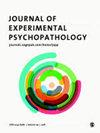书面暴露与处方治疗广泛性焦虑症的初步试验
IF 1.9
4区 医学
Q4 PSYCHIATRY
引用次数: 5
摘要
本实验测试了一种针对广泛性焦虑障碍(GAD)的新型书面暴露干预,该干预包括对参与者最大恐惧的指导重写。在描述了他们最害怕的事情后,GAD成人(N = 79)被随机分配到三种写作干预中的一种,每一种干预包括连续三天的三个阶段:(1)标准书面暴露(WE),(2)书面暴露与重写(RWE),(3)中性对照写作(NC)。在干预前和干预后以及随访1周和1个月时对症状和焦虑相关过程进行测量。在所有三种情况下,担忧情绪都显著下降。WE组的参与者报告说他们对焦虑的恐惧显著减少,而RWE组的参与者报告说他们对愤怒的恐惧显著减少。RWE组和NC组的参与者报告说,他们对积极情绪的恐惧显著减少。在RWE之后,参与者认为他们害怕的场景成本更低,并且认为自己能够更好地应对它,而在WE和NC中的参与者没有表现出这些变化。认知回避、不确定性容忍和消极问题取向没有改变。研究结果表明,总的来说,RWE并不优于WE,需要更多的研究来评估它们的治疗潜力。本文讨论了该方法的优势和局限性,以期为今后的广泛性焦虑症暴露研究提供参考。本文章由计算机程序翻译,如有差异,请以英文原文为准。
A preliminary test of the therapeutic potential of written exposure with rescripting for generalized anxiety disorder
This experiment tested a novel written exposure intervention for generalized anxiety disorder (GAD) that consisted of guided rescripting of participants’ worst fear. After describing their worst fear, adults with GAD (N = 79) were randomly assigned to one of three writing interventions, each consisting of three sessions on consecutive days: (1) standard written exposure (WE), (2) written exposure with rescripting (RWE), and (3) neutral control writing (NC). Measures of symptoms and worry-associated processes were administered at pre- and post-intervention, and at 1-week and 1-month follow-ups. Worry declined significantly in all three conditions. Participants in WE reported significant reductions in fear of anxiety, whereas those in RWE reported significant reductions in fear of anger. Participants in RWE and NC reported a significant decrease in fear of positive emotion. Following RWE, participants perceived their feared scenario as less costly and perceived themselves as better able to cope with it, whereas participants in the WE and NC did not show these changes. Cognitive avoidance, intolerance of uncertainty, and negative problem orientation did not change. Findings suggest overall, RWE was not superior to WE, and that more research is needed to assess their therapeutic potential. Strengths and limitations are discussed for the benefit of future research on exposure for GAD.
求助全文
通过发布文献求助,成功后即可免费获取论文全文。
去求助
来源期刊

Journal of Experimental Psychopathology
Medicine-Psychiatry and Mental Health
CiteScore
2.00
自引率
0.00%
发文量
19
审稿时长
11 weeks
期刊介绍:
The Journal of Experimental Psychopathology (EPP) is an open access, peer reviewed, journal focused on publishing cutting-edge original contributions to scientific knowledge in the general area of psychopathology. Although there will be an emphasis on publishing research which has adopted an experimental approach to describing and understanding psychopathology, the journal will also welcome submissions that make significant contributions to knowledge using other empirical methods such as correlational designs, meta-analyses, epidemiological and prospective approaches, and single-case experiments.
 求助内容:
求助内容: 应助结果提醒方式:
应助结果提醒方式:


